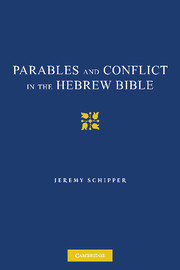Book contents
- Frontmatter
- Contents
- Preface
- Abbreviations
- 1 Breaking Down Parables: Introductory Issues
- 2 Devouring Parables: Jotham's Parabolic Curse in Judges 9
- 3 Overallegorizing and Other Davidic Misinterpretations in 2 Samuel 11–12
- 4 Changing Face and Saving Face: Parabolic Petitions in 2 Samuel 14
- 5 Grasping the Conflict: Ahab's Negotiation of Conflicts and Parables in 1 Kings 20
- 6 Intellectual Weapons: The Parable's Function in 2 Kings 14 and 2 Chronicles 25
- 7 Conclusions and Implications for the Study of Hebrew Bible Parables
- Notes
- Works Cited
- Scriptural and Extra-Biblical Texts Index
- General Index
6 - Intellectual Weapons: The Parable's Function in 2 Kings 14 and 2 Chronicles 25
Published online by Cambridge University Press: 30 September 2009
- Frontmatter
- Contents
- Preface
- Abbreviations
- 1 Breaking Down Parables: Introductory Issues
- 2 Devouring Parables: Jotham's Parabolic Curse in Judges 9
- 3 Overallegorizing and Other Davidic Misinterpretations in 2 Samuel 11–12
- 4 Changing Face and Saving Face: Parabolic Petitions in 2 Samuel 14
- 5 Grasping the Conflict: Ahab's Negotiation of Conflicts and Parables in 1 Kings 20
- 6 Intellectual Weapons: The Parable's Function in 2 Kings 14 and 2 Chronicles 25
- 7 Conclusions and Implications for the Study of Hebrew Bible Parables
- Notes
- Works Cited
- Scriptural and Extra-Biblical Texts Index
- General Index
Summary
“What a period, when kings, in diplomatic communications, wielded the intellectual weapon of the fable!”
–Gerhard von Rad, Wisdom in Israel“The point of this homely fable cf. that of Jotham, also of trees (Judg. 9.7–15), needs no elaboration. It may be matched by a homely saying as pregnant and even more brief among the Arabs, e.g. ‘The mule says the horse was his father’.”
–John Gray, I and II Kings: A CommentaryOf all the parables we have discussed so far, the one appearing in 2 Kings 14 and 2 Chronicles 25 has received the least amount of scholarly attention. Many commentators seem to agree implicitly with John Gray's assessment in this chapter's second epigraph, namely, they see the parable's interpretation as self-evident. As with Gray, they seem content to go no further than labeling it as a fable and noting that it shares arboreal imagery with Judges 9. Occasionally, they cite similar imagery in other ancient Near Eastern fables. This dearth of scholarly attention means that relatively few have considered how it addresses the conflict in the surrounding narrative in much detail.
As in 1 Kings 20, the parable in 2 Kings 14 and 2 Chronicles 25 addresses an international conflict. In this case, the conflict involves the northern kingdom of Israel, the southern kingdom of Judah, and their neighbor Edom. The Judean king Amaziah trounces the Edomites, killing thousands (2 Kgs 14:7; 2 Chr 25:5–16).
- Type
- Chapter
- Information
- Parables and Conflict in the Hebrew Bible , pp. 93 - 110Publisher: Cambridge University PressPrint publication year: 2009



